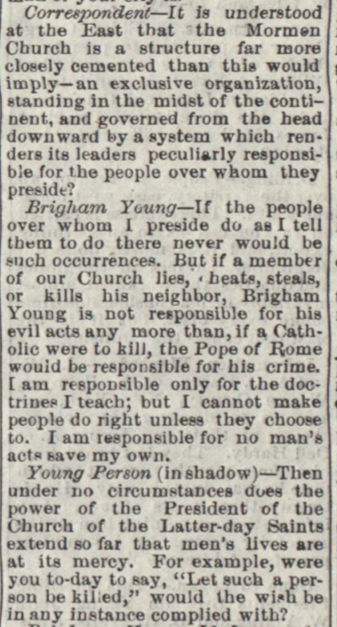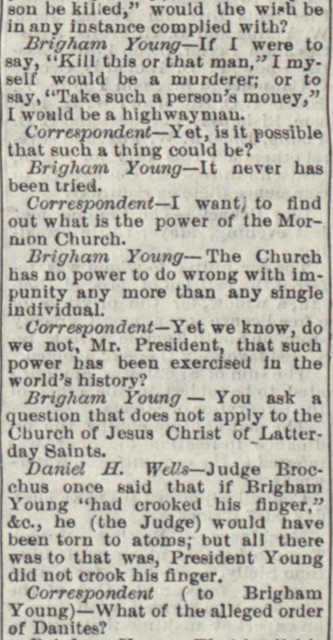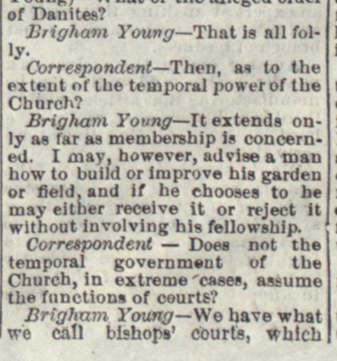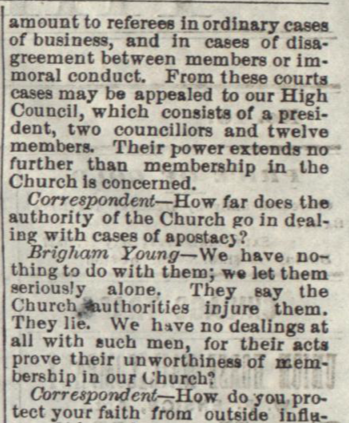BY states that church leaders have no authority to order executions.
- Type
- Interview
- Hearsay
- Scribed VerbatimReprintJournalism
- Reference
"Interview with Brigham Young," April 30, 1877 in Deseret News 26, no. 16 (May 23, 1877): 2.
- Scribe/Publisher
- Deseret News
- Audience
- Reading Public
- Transcription
Correspondent—It is understood at the East that the Mormon Church is a structure far more closely cemented than this would imply—an exclusive organization, standing in the midst of the continent, and governed from the head downward by a system which renders its leaders peculiarly responsible for the people over whom they preside?
Brigham Young—If the people over whom I preside do as I tell them to do there never would be such occurrences. But if a member of our Church lies, cheats, steals, or kills his neighbor, Brigham Young is not responsible for his evil acts any more than, if a Catholic were to kill, the Pope of Rome would be responsible for his crime. I am responsible only for the doctrines I teach; but I cannot make people do right unless they choose to. I am responsible for for no man's acts save my own.
Young Person (in shadow)—Then under no circumstances does the power of the President of the Church of the Latter-day Saints extend so far that men's lives are at its mercy. For example, were you to-day to say, "Let such a person be killed," would the wish be in any instance complied with?
Brigham Young—If I were to say, "Kill this or that man," I myself would be a murderer; or to say, "Take such a person's money," I would be a highwayman.
Correspondent—Yet, is it possible that such a thing could be?
Brigham Young—It never has been tried.
Correspondent—I want to find out what is the power of the Mormon Church.
Brigham Young—The Church has no power to do wrong with impunity any more than any single individual.
Correspondent—Yet we know, do we not, Mr. President, that such power has been exercised in the world's history?
Brigham Young—You ask a question that does not apply to the Church of Jesus Christ of Latter-day Saints.
Daniel H. Wells—Judge Brochus once said that if Brigham Young "had crooked his finger," &c. he (the Judge) would have been torn to atoms; but all there was to that was, President Young did not crook his finger.
Correspondent (to Brigham Young)—What of the alleged order of Danites?
Brigham Young—That is all folly.
Correspondent—Then, as to the extent of the temporal power of the Church?
Brigham Young—It extends only as far as membership is concerned. I may, however, advise a man how to build or improve his garden or field, and if he chooses to he may either receive it or reject it without involving his fellowship.
Correspondent—Does not the temporal government of the Church, in extreme cases, assume the function of courts?
Brigham Young—We have what we call bishops' courts, which amount to referees in ordinary cases of business, and in cases of disagreement between members or immoral conduct. From these courts cases may be appealed to our High Council, which consists of a president, two councillors and twelve members. Their power extends no further than membership in the Church is concerned.
Correspondent—How far does the authority of the Church go in dealing with cases of apostacy?
Brigham Young—We have nothing to do with them; we let them seriously alone. They say the Church authorities injure them. They lie. We have no dealings at all with such men, for their acts prove their unworthiness of membership in our Church?
- Citations in Mormonr Qnas
The B. H. Roberts Foundation is not owned by, operated by, or affiliated with the Church of Jesus Christ of Latter-day Saints.




